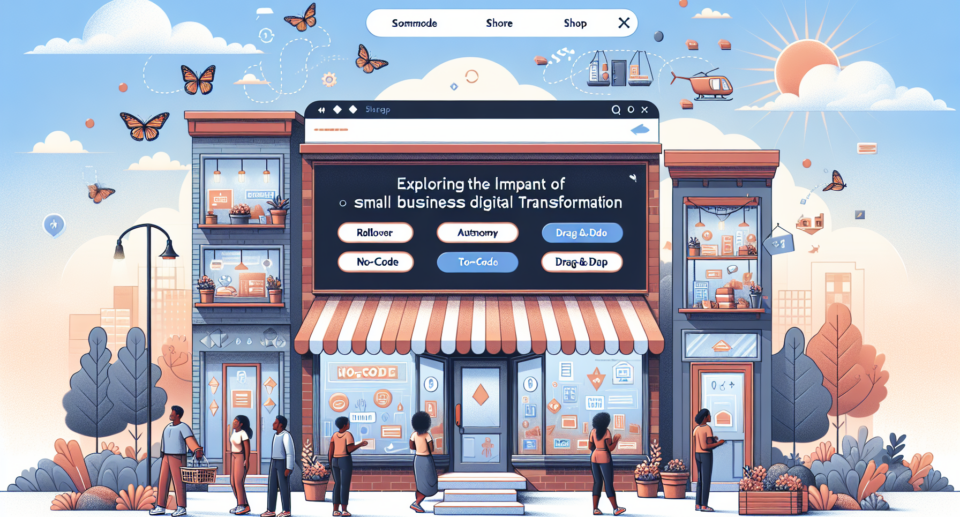Exploring the Impact of No-Code Platforms on Small Business Digital Transformation

The digital landscape is evolving at an unprecedented pace, and small businesses are consistently being challenged to keep up with the latest technologies to remain competitive. With the rise of no-code platforms, small businesses have found a powerful ally in their journey towards digital transformation. These platforms offer the promise of democratizing technology, enabling individuals without technical expertise to build, customize, and deploy digital solutions efficiently.
The Democratization of Technology for Small Businesses
Small businesses have traditionally been limited by the high costs and complexity associated with digital development. The advent of no-code platforms breaks down these barriers, allowing entrepreneurs to create custom applications, automate workflows, and improve their online presence without needing to invest in expensive development resources. This has made it possible for small enterprises to compete on a more level playing field with larger organizations.
Increasing Efficiency and Reducing Costs
No-code platforms significantly reduce the time and money that small businesses need to spend on developing digital tools. Without the need to hire specialized developers, they can quickly adapt to market changes and customer needs. This agility is a game-changer for small operations where resources are often tight. Additionally, these platforms often come with pre-built templates and drag-and-drop functionalities, making the process even more efficient.
Empowering Creativity and Innovation
Another impact of no-code platforms is the empowerment of small business owners to take charge of their own digital strategies. They are no longer passive recipients of technology but active creators, using these platforms to innovate and solve problems unique to their business in creative ways. This empowerment fosters a culture of innovation within the small business ecosystem.
Challenges and Considerations
Despite the benefits of no-code platforms, small businesses face challenges in implementing them effectively. There’s a learning curve associated with understanding the capabilities and limitations of each platform. In addition, as businesses grow, they may find that their no-code solutions need to be supplemented or replaced with more robust, custom-coded systems to scale effectively.
No-Code and the Future of Small Business Digital Transformation
As small businesses continue to embrace no-code platforms, we can expect a significant shift in how digital transformation is approached. These platforms will not only spur growth but also create a more inclusive economy by making technology accessible to a wider range of entrepreneurs. As the technology advances, so too will the capabilities of no-code solutions, further enhancing their role in the small business sector.
Integrating WebViewGold for a Seamless Transition from Web to Mobile
In line with the no-code revolution, small businesses seeking to extend their digital transformation into the mobile app space can take advantage of solutions like WebViewGold. This tool is a testament to the simplicity and accessibility that no-code platforms provide. With WebViewGold, turning a website into a fully functional app for Android is a swift and straightforward process, eliminating the need for extensive coding knowledge. It stands as a clear example of how no-code platforms are not just changing the game but also leveling the playing field for small businesses in the digital arena.
In conclusion, no-code platforms are enabling small businesses to undertake digital transformation with greater confidence and fewer resources. By providing the tools needed to create, adapt, and innovate, these platforms are changing the narrative around who can be a tech creator. As small businesses look to capitalize on these opportunities, solutions like WebViewGold will continue to offer quick and simple ways to bridge the gap between a traditional website and the burgeoning app market. This is just the beginning of what no-code can do for small entrepreneurs looking to make a big digital impact.
“`html
Introduction to No-Code Platforms
The digital landscape is evolving at an unprecedented pace, and small businesses are consistently being challenged to keep up with the latest technologies to remain competitive. With the rise of no-code platforms, small businesses have found a powerful ally in their journey towards digital transformation. These platforms offer the promise of democratizing technology, enabling individuals without technical expertise to build, customize, and deploy digital solutions efficiently.
The Democratization of Technology for Small Businesses
Small businesses have traditionally been limited by the high costs and complexity associated with digital development. The advent of no-code platforms breaks down these barriers, allowing entrepreneurs to create custom applications, automate workflows, and improve their online presence without needing to invest in expensive development resources. This has made it possible for small enterprises to compete on a more level playing field with larger organizations.
Increasing Efficiency and Reducing Costs
No-code platforms significantly reduce the time and money that small businesses need to spend on developing digital tools. Without the need to hire specialized developers, they can quickly adapt to market changes and customer needs. This agility is a game-changer for small operations where resources are often tight. Additionally, these platforms often come with pre-built templates and drag-and-drop functionalities, making the process even more efficient.
Empowering Creativity and Innovation
Another impact of no-code platforms is the empowerment of small business owners to take charge of their own digital strategies. They are no longer passive recipients of technology but active creators, using these platforms to innovate and solve problems unique to their business in creative ways. This empowerment fosters a culture of innovation within the small business ecosystem.
Challenges and Considerations
Despite the benefits of no-code platforms, small businesses face challenges in implementing them effectively. There’s a learning curve associated with understanding the capabilities and limitations of each platform. In addition, as businesses grow, they may find that their no-code solutions need to be supplemented or replaced with more robust, custom-coded systems to scale effectively.
No-Code and the Future of Small Business Digital Transformation
As small businesses continue to embrace no-code platforms, we can expect a significant shift in how digital transformation is approached. These platforms will not only spur growth but also create a more inclusive economy by making technology accessible to a wider range of entrepreneurs. As the technology advances, so too will the capabilities of no-code solutions, further enhancing their role in the small business sector.
Integrating WebViewGold for a Seamless Transition from Web to Mobile
In line with the no-code revolution, small businesses seeking to extend their digital transformation into the mobile app space can take advantage of solutions like WebViewGold. This tool is a testament to the simplicity and accessibility that no-code platforms provide. With WebViewGold, turning a website into a fully functional app for Android is a swift and straightforward process, eliminating the need for extensive coding knowledge. It stands as a clear example of how no-code platforms are not just changing the game but also leveling the playing field for small businesses in the digital arena.
In conclusion, no-code platforms are enabling small businesses to undertake digital transformation with greater confidence and fewer resources. By providing the tools needed to create, adapt, and innovate, these platforms are changing the narrative around who can be a tech creator. As small businesses look to capitalize on these opportunities, solutions like WebViewGold will continue to offer quick and simple ways to bridge the gap between a traditional website and the burgeoning app market. This is just the beginning of what no-code can do for small entrepreneurs looking to make a big digital impact.
